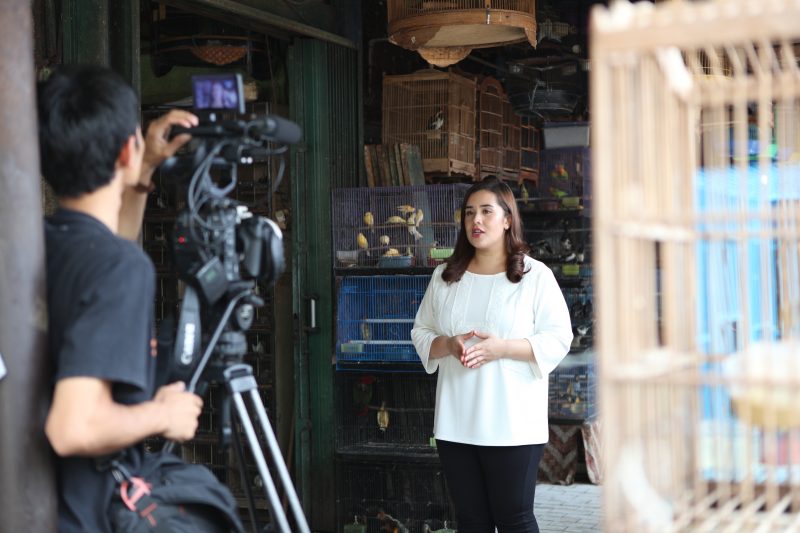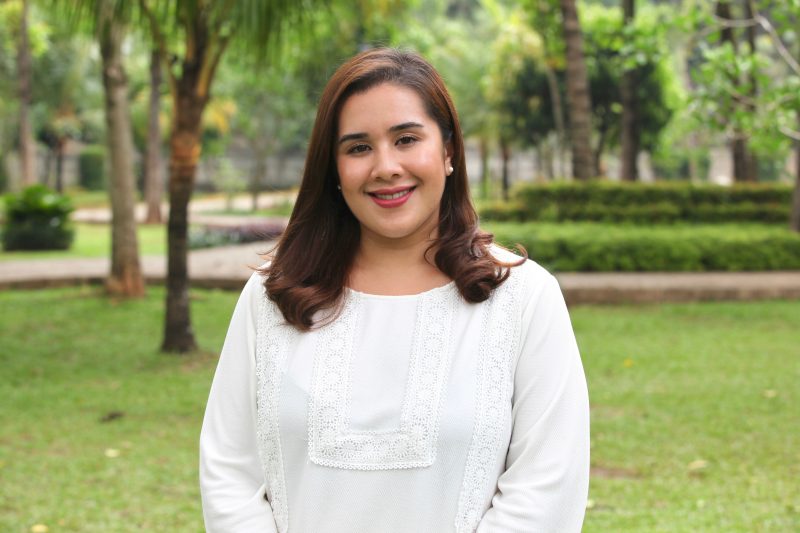Before assuming her post with CGTN, Silkina Ahluwalia was a producer at an English-language news channel in Jakarta. She had a friend working at CGTN who offered her the job and, without a face-to-face interview, she was immediately hired. “Indonesia is a very, very busy place for news. There’s always something happening,” Silkina says. “Anything can happen anytime, but that’s what makes it an exciting place to report the news.” She covers business, economics, natural disasters, culture and human interest stories.
An Indonesian national of Indian heritage, Silkina came back to Indonesia in 2015 after living in Malaysia for eight years. She got interested in CGTN because the stories it covers are generally in line with the topics she likes to cover and is generally curious about. She works as a freelancerand she pitches stories every week via email to the directors of the news channel.
Silkina works on days she has stories to file or when she receives requests from CGTN headquarters to go live from the Associated Press Television News studio in Jakarta. Although she enjoys the flexibility of freelance work, sometimes it means she doesn’t have weekends off and Tuesday and Wednesday become her weekend.
The stories of interest for CGTN’s audience include the many business opportunities that are opening up in Indonesia for Chinese investors. News about investments already in place are also of great interest. Some of the most popular sectors are manufacturing, infrastructure, and the digital industry. “There is huge potential for the digital industry here in Indonesia,” Silkina explains.
In 2019 Silkina will be busy reporting on Indonesia’s presidential election but she feels the gubernatorial elections in June 2018 might be a little bit too “local” for China.
CGTN is very interested in anti-terrorism stories, including what Indonesia is doing to counter terrorism, and how other countries are helping Indonesia in its fight. “I think it’s a global issue right now,” Silkina says.
The Indonesian capital is of greatest interest to the CGTN audience, but Singkawang and Bangka Belitung are especially popular due to their large Chinese communities. Other areas are of interest too if the stories are newsworthy because CGTN reaches a global audience.
When Silkina covered the Mount Agung eruption from Bali her focus was on how many Chinese travellers were stranded on the island, because this was the angle of primary interest to CGTN.
“But I managed to do a variety of stories,” she tells Indonesia Expat. “I told them that it is also important to show China and the entire CGTN audience how the locals were dealing with it.” She did a story from one of the evacuation centres in Klungkung regency, around 40 kilometres from the centre of Bali, that was broadcasted live through CGTN’s official Facebook fan page. She took viewers around the temporary shelter and interviewed some of the nearly 1,200 people there.
Essentially, CGTN helps its viewers see how Chinese communities around the world celebrate their Chinese culture and heritage. How these people blend cultures from their local host country with the Chinese culture is also an important focus. She recently reported about the Chinese New Year parade in the city of Solo that blended the Chinese and Javanese cultures into one spectacle that included lion dances and artistic performances.
Silkina says that CGTN has never restricted or censored her reporting. Once she has finished filming, the team in Beijing looks at the script to check for grammatical errors, but other than that she has the freedom to choose her stories. She knows that she has the power to show the world what Indonesia really has to offer because CGTN has viewers around the globe. She has received messages from viewers in Pakistan, the Philippines, and Africa and many other countries. “So they don’t have a one-sided opinion of what Indonesia is,” she says, “and they don’t stereotype Indonesia. They get the chance to see Indonesia for the wonderful and tolerant country that it is.”




